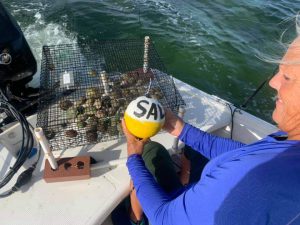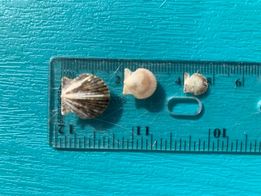
Over the last year, a team of volunteers worked hard to help give the bay scallop population off Hernando’s coast a boost. These volunteers go by the name of “Scallop Sitters.” Their efforts have not gone unnoticed by visitors and residents scalloping in the area.
Florida’s bay scallops are bivalve mollusks. They have two shells joined by a hinge and use a muscle, the tasty piece harvested, to open and close the two shells. They use 42 tiny blue eyes along the outer rim of the shells to detect movement and can swim short bursts to escape predators. For food, bay scallops filter small particles from the water and use gills for breathing.
In the fall and winter months, after the recreational harvest season closes, bay scallops reproduce. Although each scallop has male and female parts, they do not release their eggs and sperm simultaneously. Fertilized eggs develop into larval scallops and drift in the water column for ten to 14 days. Eventually, the juvenile scallops will settle into seagrass beds and live out the remainder of their adult life.

Because bay scallops in Florida only live up to two years, the local population must replenish itself annually to remain stable. Changing environmental conditions, such as sedimentation and too much freshwater, can impact local populations.
From 2017 to 2020, harvesters reported difficulties finding scallops in Hernando’s waters. In response, UF/IFAS Scallop Sitters stepped in to help restore the bay scallops and worked hard throughout the fall and winter 2020 spawning season caring for the scallops. Wild-caught scallops were anchored in predator exclusion cages near seagrass beds throughout Hernando’s coastal waters, allowing scallops to remain close to each other, potentially increasing the chances of released scallop eggs becoming fertilized. Once the spawning season commenced, the remaining adults were released back into the seagrass beds.
The 2021 UF/IFAS Scallop Sitter project in Hernando is now in full swing. If you see anchored cages containing scallops near seagrass beds, please do not disturb the cages and report any tampering to FWC Law Enforcement Officers. Trained and legally permitted volunteers will continue to care for the scallops throughout the 2021 spawning season.
Note: Project was sponsored by Bayside Auto Works, Hernando Environmental Land Protectors, and Florida Fish and Wildlife Conservation Commission. All work is conducted under FWC SAL#2217. The University of Florida is an equal opportunity institution.
 0
0
